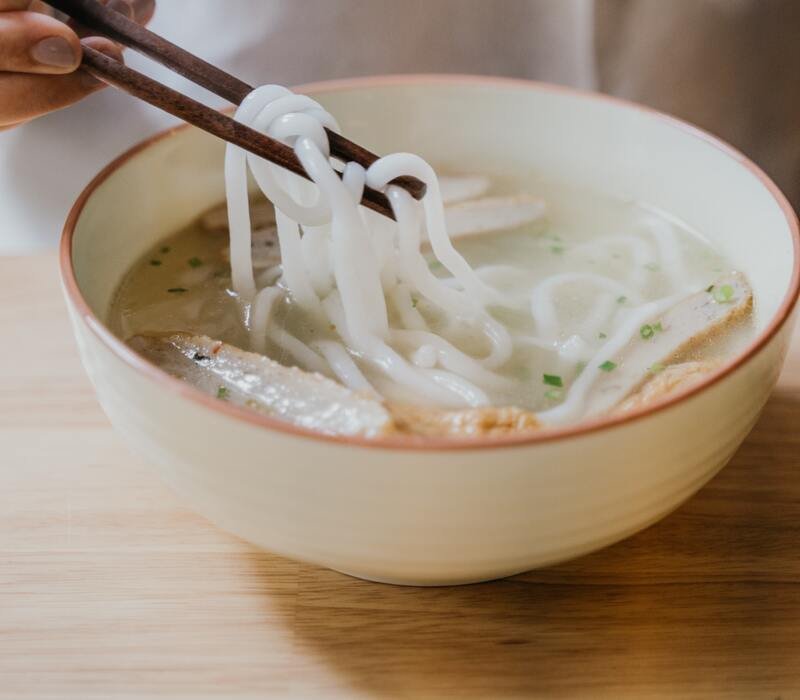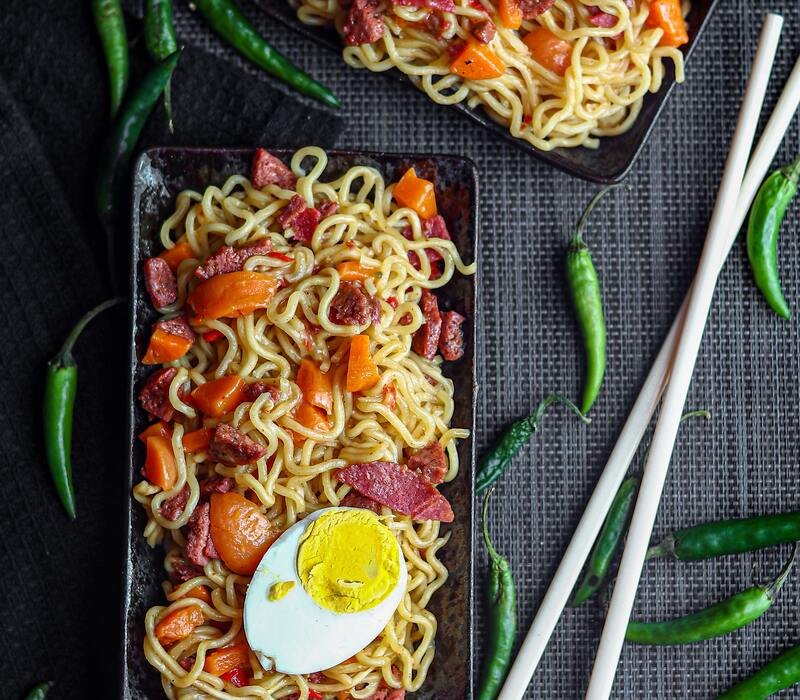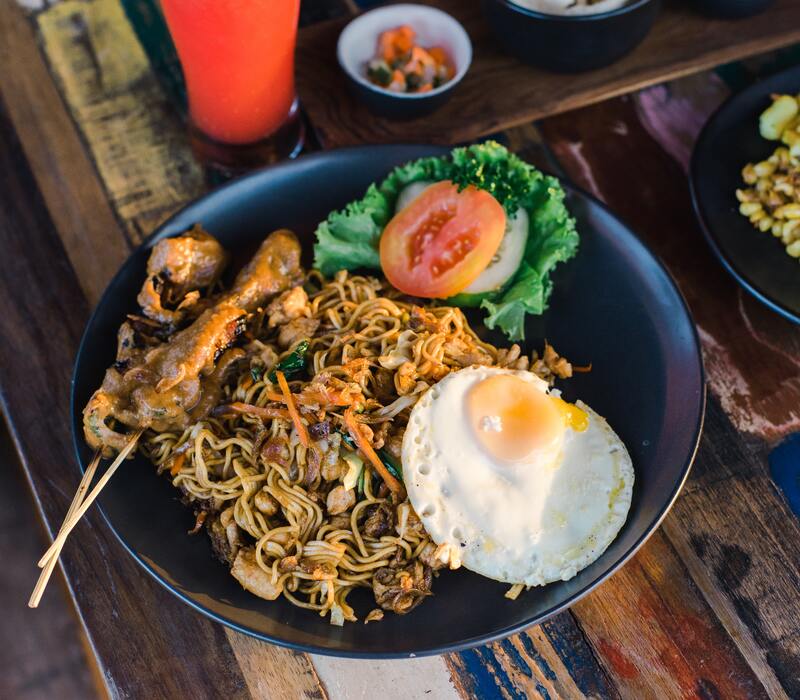Noodles come in a variety of varieties that are frequently used in cooking. Rice noodle vs egg noodle is the two most common varieties. Despite having similar looks, each one of them has unique advantages that make them more suitable for a variety of cooking methods as well as foods.
Let’s compare the two types of noodles as well as discuss which is better for your next dish. Therefore, rice noodles are a good option for dishes like soups where you want to highlight the flavors of the other ingredients, whereas egg noodles are better for dishes where you want the noodles to enhance the flavor of the dish as a whole.
Rice and egg noodles are the two most widely used varieties. These two varieties are both full of carbohydrates as well as simple to prepare. Take a look at some of these two types of noodles differences as well as similarities.
Page Contents
Rice Noodle

Rice flour as well as water use to make rice noodles. To give the noodles a slurpy as well as a sticky feel, corn flour, and tapioca are sometimes also added. They have different thicknesses.
They are flavorless and easily prepare in a variety of ways, such as soups, curries, stir-fries, as well as salads. In terms of nutrition, a cup of rice noodles contains about 192 calories as well as 1.20 grams of fat. They contain little protein because they are made entirely of rice flour and water.
What is Rice Noodle
Major ingredients in rice noodles include water but also rice flour. To enhance the look but also the texture of the noodles, tapioca as well as corn flour may occasionally add.
Rice noodles are often long noodles, just like egg noodles. They do, however, come in a range of widths. Many dishes in Thai cuisine employ thin rice noodles. However, recipes with rice noodles need wide noodles.
Egg Noodles

As the name implies, egg noodles produce from wheat flour and eggs. Similar to rice noodles, they come in a variety of thicknesses.
Egg noodles have a high protein content as well as a high rate of water absorption because they make with eggs. They are ideal for stir-frying over high heat because of their hard as well as chewy texture. They have a high protein level but low cholesterol as well as carbohydrate content.
What is Egg Noodle
Long and thin noodles are egg noodles. Egg noodles make with a lot of eggs compared to other varieties of noodles, as their name suggests. They make with salt, water, eggs, as well as wheat flour.
Italian pasta, as well as egg noodles, are related but not the same. Semolina, which is a coarse durum wheat flour, use to make pasta in Italy. In contrast, wheat flour used in egg noodles has finely ground. To make egg noodles, combine wheat flour, eggs, water, as well as salt.
Nutritional Differences
Rice Noodle
Rice noodles are both gluten-free as well as vegan, in contrast to egg noodles. They don’t contain any wheat as well as dairy ingredients, which explains why. It is possible to make them with red, white, as well as brown rice.
Compared to egg noodles, rice noodles are fewer in calories, fat, as well as protein. They contain more carbs as well.
About 193 calories, 0.4 grams of fat, 43.8 grams of carbohydrates, 1.8 grams of fiber, as well as 1.6 grams of protein are present in one cup of cooked rice noodles make from white rice.
Egg Noodle
Egg noodles have more protein than ordinary noodles since they contain eggs. About 221 calories, 3.3 grams of fat, 40.3 grams of carbohydrates, 1.9 grams of fiber, as well as 7.3 grams of protein are present in one cup of cooked egg noodles.
With a score of 40 on the glycemic index, egg noodles are less likely to trigger a blood sugar surge than foods with higher ratings.
Rice Noodle Vs Egg Noodle Taste and Texture
Rice noodles have a more straightforward, bland flavor. Including rice, it has a bland flavor that makes it a great dietary base for a variety of cuisines like curries, soups, as well as Thai basil stir-fry noodles.
If you’ve ever wondered why rice noodles are so simple to slurp down, it’s because chefs typically add tapioca as well as corn flour to rice noodles to give them a smoother as well as chewier texture.
Egg noodles, on the other hand, have a flavor that is slightly salty as well as delicious. The eggs, one of the key ingredients used to make these noodles, give them a faintly savory, creamy flavor.
On the other hand, salt is what gives egg noodles their salty flavor. It adds noodle masters to their noodles to assist strengthen the dough structure as well as give the noodles a springier, chewier texture.
Rice Vs Egg Noodle That are Both Gluten-free or Vegan
Nearly all varieties of rice noodles are gluten-free. All three gluten-free starches are corn flour, rice flour, as well as tapioca starch. A vegan-friendly dish produced using plant-based ingredients is rice noodles. As a result, you can include most types of rice noodles in your meal plans if you’re vegan as well as following a gluten-free diet.
There are, however, certain variants that include gluten. Some producers make their rice noodles with wheat flour as well as various starches. The next time you purchase rice noodles, pay close attention to the components.
Well, the majority of egg noodles produce with wheat flour, thus they do contain gluten.
Nevertheless, some producers create gluten-free versions using substitutes like all-purpose gluten-free flour. In this manner, egg noodles can still enjoy by those who cannot consume goods containing gluten. However, because eggs are one of their key ingredients, egg noodles are not vegan.
Which Type of Noodle is Preferable, Egg vs Rice?
Both offer benefits and drawbacks in terms of flavor as well as health. Some individuals enjoy egg noodles’ varied sizes as well as forms as well as their springy texture.
However, rice noodles come in a variety of chewy, slurpable flavors that are available in the market if you are seeking gluten-free ones. Everything ultimately boils down to personal preference, including the flavor, texture, nutritional content, as well as appearance.
Check out the other noodles recipes I have on my blog if you love these rice and egg noodles.
Conclusion
While they are not the same, egg noodles as well as rice noodles are comparable in that you can successfully use them interchangeably. As soon as you begin cooking these two varieties of noodles, their distinctions will become clear.
Particularly if they produce with white rice flour, rice noodles frequently retain their white hue. When cooked as well as prepared for consumption, egg noodles take on a yellow hue.
You can take your personal preferences into account when deciding which of these two varieties of noodles to choose in addition to their differences.
No matter which noodles you choose, they will all satisfy you because they can enhance the flavor of any kind of meal as well as the greatest option if you need to eat quickly.
Yes! You can substitute rice noodles for egg noodles and vice versa. Everything is up to personal preference. They can be prepared in tandem as well. Both egg noodles, as well as rice noodles, can be used in stir-fried noodle recipes.
The Miki Bihon dish is one illustration. It uses bison, a type of rice noodle, as well as Miki, fresh egg noodles that are stir-fried with additional meats and vegetables.
Wheat flour and eggs are the only two ingredients used to make egg noodles. Although there are some small and thin variations, they typically have a flat and lengthy shape. Egg noodles go by a variety of names, including Youman, the thin egg noodle used is a staple of Asian cuisine.
FAQs
Even though they don’t have as many nutrients as pasta, egg noodles can nevertheless provide you with extra nutrients that pasta won’t. However, you are not required to pick just one. For a balanced diet, keep both in your cupboard and top off each with extra veggies, meats, as well as nutritional sources.
Rice noodles are a terrific complement to your diet and are completely nutritious. They nevertheless have less fiber than other types of noodles, such as spaghetti squash or whole wheat noodles. Studies show that consuming more fiber promotes healthy gut flora, efficient digestion, as well as control of blood sugar.
Cooked egg noodles come with 46 milligrams of cholesterol as well as 3 grams of fat per 1-cup serving. For instance, the same amount of cooked spaghetti contains 0 mg of cholesterol as well as 1 gram of fat. Similar to carbohydrates, cholesterol has long been shunned because of a potential connection to heart disease.
Traditional egg noodles are not keto-friendly because they have 49 grams of carbohydrates. Keto egg noodles, on the other hand, have just 3 net carbohydrates per serving. They are therefore a fantastic keto pasta choice.
Compared to egg noodles, rice noodles are fewer in calories, fat, as well as protein. They contain more carbs as well. About 193 calories, 0.4 grams of fat, 43.8 grams of carbohydrates, 1.8 grams of fiber, as well as 1.6 grams of protein are present in one cup of cooked rice noodles made from white rice.
Compared to egg noodles, rice noodles are slightly lower in calories. Rice noodles have 192 calories per 1-cup serving compared to 200 calories for egg noodles. This is not a significant difference, but it can matter if you are following an extremely low-calorie diet under a doctor’s guidance.








